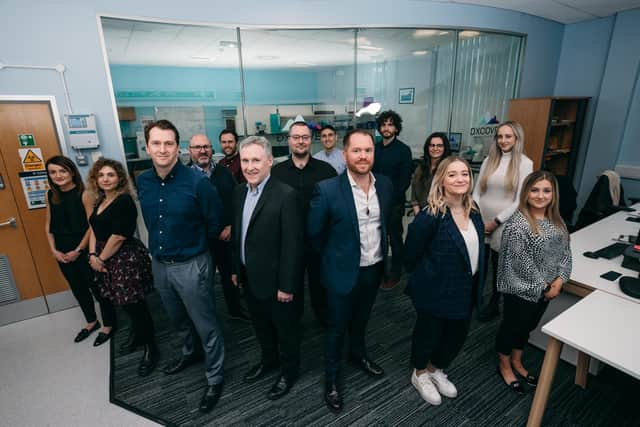Glasgow-based blood test pioneer Dxcover secures 'significant' seven-figure funding injection
The firm has raised the £9.7m sum through a Series A investment round and grant funding. The £7.5m funding round was led by existing investors Eos Advisory LLP, Mercia Asset Management, Scottish Enterprise, the University of Strathclyde, SIS Ventures, and Norcliffe Capital, which were joined by US-based life science investor Mark Bamforth of Thairm Bio. The remainder of the total comprises a £2.2m grant from the European Innovation Council.
The Glasgow-based medtech business, which has 15 staff and is expanding its network in Europe and the US, said the capital will support the ongoing development of the Dxcover Liquid Biopsy Platform for the detection of early-stage cancers, including brain and colorectal. It added that its novel platform uses infrared spectroscopy to analyse patient blood samples and artificial intelligence algorithms to detect the presence or absence of disease.
Advertisement
Hide AdAdvertisement
Hide AdDxcover also said that having initially proven the technology for the detection of brain cancer, it expanded its focus to eight cancers and a study in 2022 demonstrated its ability to detect multiple diseases of this type at the earliest stage.


Chief executive Dr Mark Hegarty said: “This is a very significant funding milestone in our mission to detect cancer early and improve survival and quality of life for patients. Having demonstrated our multi-cancer capability, we can now focus on building the pipeline of organ-specific tests, beginning with a multi-centre study to gain regulatory approval for the brain cancer test. We will also expand our data on colorectal cancer, one of the leading causes of death worldwide, and continue our work on collaborative projects.”
Endorsement
Andrew McNeill, managing partner of St Andrews-based Eos Advisory, added: “Dxcover fits perfectly with Eos’s focus on finding and scaling Scottish companies that address key global issues. Their ability to diagnose early-stage cancers could transform survival rates and patient outcomes, and this investment is testament to their quality of data and growth.”
Julian Dennard, head of Enterprise Investment Scheme funds at Mercia, which has supported Dxcover since its inception, said: “Dxcover analyses tumour signals and non-tumour signals that genetic tests cannot detect. We are excited about the recent results which show its ability to detect multiple cancers at the earliest stage, when more lives can be saved. The investment will build on the traction created by that study and aims to make Dxcover a leader in the fast-growing market for cancer diagnostics.”
Kerry Sharp, director of entrepreneurship and investment at Scottish Enterprise, commented: “Dxcover’s rapid progress and exceptional clinical results have been exciting to witness as an investor and also a supporter of the company through our High Growth Spinout Programme since its formation. The importance of its work can’t be exaggerated, and this latest round of funding underlines our recognition of that and our belief that Dxcover can be among the next big Scottish life sciences success stories.”
Dxcover was formed in 2019, based on the research of its chief technical officer Professor Matthew J. Baker of the University of Strathclyde, who said: “Our approach is complementary to other technologies and has the ability to enhance them.”
Comments
Want to join the conversation? Please or to comment on this article.